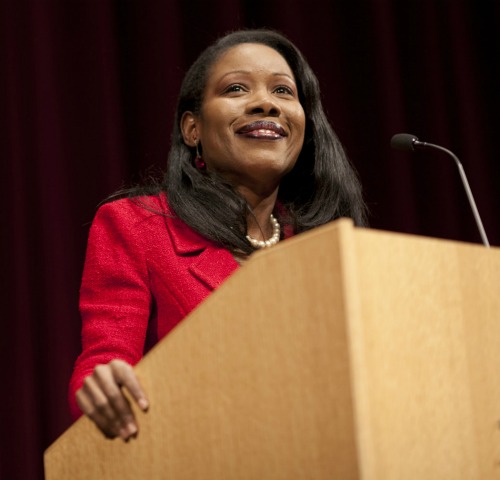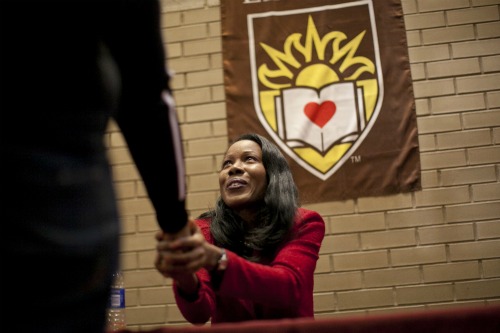Pulitzer-winning author recounts African-American mass migration
Pulitzer Prize-winning journalist Isabel Wilkerson challenged a Lehigh audience to find “the sun within all of us,” and to embark on a spiritual migration to personal improvement and empowerment. “When everyone does better,” she said, “everyone does better.”
The former New York Times bureau chief was on campus this week to discuss her critically acclaimed book, The Warmth of Other Suns, which she wrote in 2011 to chronicle the decades-long migration of 6 million black citizens, who left the South between 1915 and 1970 in search of a better life.
In her hour-long talk, Wilkerson detailed the 15 years of painstaking work that went into researching her landmark book, wryly noting that it was perhaps best she didn’t realize the level of time and effort that would go into writing it.
“I probably never would have embarked on it if I did,” she told a crowd of roughly 200 gathered in Baker Hall. “But now, I have the luxury and the beautiful gift of knowing the three amazing people I wrote about, and many more I came to know. They truly changed my life and the way I think of my own identity.”
Much as those profiled in her book fled from oppressive, untenable conditions in the early 20th century South, Wilkerson said the ancestors of everyone in the audience sought better lives and greater opportunity—particularly for their children—in unknown destinations.
“How many of us wouldn’t even exist if someone in our backgrounds hadn’t done what the people in this book did?” she asked. “And think about what propelled them. Think about how difficult it must have been to gather the courage to start life all over again in an alien land. And think about how difficult and oppressive life must have been for them to see this as their only real option.”
‘Delightfully removed’
Stating that the goal of her book was to illuminate a chapter of American history by detailing an entrenched caste system that separated American citizens, Wilkerson said she “looked for all the ways to make it real for the readers,” and drew upon extensive research to unearth these details. In one Raleigh, N.C., newspaper archive, for example, she found references to a Jim Crow Bible. “And I thought, can you do that? Can you actually segregate the word of God?” she asked.
In traveling around the country to discuss her book, Wilkerson said she’s been struck by the level of emotional distance between her high school-aged audiences and this period of history. “Bless their hearts—as they say in the South—but they just can’t even imagine what it was like,” she said. “They are so delightfully removed.”
Wilkerson recounted how she explains the institutionalized injustices and constant assaults on human dignity prevalent at the time, including something as mundane as being allowed to pass a car on the road—a privilege denied African Americans in the Jim Crow South.
“Then I ask them to think about the level of self-control and discipline that was needed to abide by these rules. It’s almost beyond human capacity,” she said. “The simple act of merely passing a car could cost you your life. You had to stay in your place. That’s what it meant to have a caste system.
“Well,” she added, “these kids are having none of that. Then the students say, ‘I would have left.’ And I say, ‘My point exactly.’ ”
‘A leaderless revolution’
The massive migration—fueled, at least at the start, by the shortage of workers during World War I that opened up opportunities for Southern blacks—altered and enriched American culture in ways that are almost incalculable, she said.
Just one example was the frail and sickly son of a sharecropping family in Alabama, which boarded a northbound train headed for Cleveland, Ohio. Once there, the son, nicknamed J.C. (short for James Cleveland) was placed in a classroom, where his teacher had trouble understanding his thick Southern accent, and mistook “J.C.” for “Jesse.”
“And that’s how Jesse Owens got his name,” Wilkerson said, referring to the legendary athlete who won four gold medals for the United States during the 1936 Olympics, which Adolf Hitler assumed would be an international showcase for Aryan strength and superiority.
Wilkerson named a long list of other athletes, playwrights, poets, musicians, and other accomplished Americans whose very existence would not be possible without the Great Migration. But perhaps even more importantly, she said, the large numbers of African Americans and the velocity with which they fled the South sent “a strong message that something was terribly wrong.”
News coverage soon followed, and pressure to address social injustice came from all over the world, she said.
“This was a leaderless revolution. It was within the decisions of individual hearts and hopes of people leaving, and beginning to recognize their amazing power. It also shows you the amazing power within all of us. They did what Lincoln couldn’t do. They did what the Emancipation Proclamation couldn’t do. They did what both houses of Congress couldn’t do. They freed themselves.”
Wilkerson’s talk was co-sponsored by the Friends of the Libraries Speaker’s Series, the Office of Academic Diversity, the Africana Studies department, and the Weinstock Center for Journalism.
Posted on:



